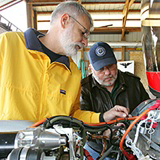Canadian EAA Technical Counselors Needed
By Ian Brown, Editor, EAA 657159, Canadian Council Board Member
December 2016 - One of our main concerns in the homebuilt movement is safety. If you have built one or more aircraft, restored a vintage aircraft, or are a licensed mechanic, you might like to consider volunteering as an EAA technical counselor. There is no better way to ensure that an aircraft has been built safely than to have another pair of experienced eyes look over your work.
The Technical Counselor program does not replace the need to get an MD-RA inspector to approve your work. MD-RA inspections are required at least twice: once before closing the wings and tail and once for a final inspection at the airport. A technical counselor can provide you with a lot more in the way of “advice” rather than “approval.” Technical counsellors are typically more local than MD-RA inspectors, and they can be expected to be consulted on an ongoing basis. Anyone who has built an aircraft before can tell you that they wish they had received advice from an experienced builder before they ever started. There are lots of logistics to think about before you ever open that first empennage kit or roll out those plans.
The process for becoming approved as an EAA technical counselor is straightforward. You must apply, be a current EAA member, and receive approval from one of the officers of your local chapter or be approved by an aircraft maintenance engineer (AME). In filling out the application you are requested to indicate areas of knowledge. No one wants to call you about fabric covering if you have no experience stitching fabric to ribs. AMEs are also expected to have amateur-built aircraft experience.
EAA tech counselors are covered by EAA for liability insurance as long as they obey the rules — they aren’t allowed to be involved in the actual build of a project, but they can certainly demonstrate skills. A technical counselor is a volunteer, so no payments are involved, and a technical counselor will never have to approve or sign off on anything.
If you think you would like to help your fellow aircraft builders with advice and guidance, you can find the application form here. There are no fees involved, but perhaps a little bit of prestige and certainly the knowledge that you have helped to make amateur-built aviation a little safer in your area. If you have more questions you can find answers here.
Retired MD-RA inspector and president of your EAA Canadian Council, Jack Dueck, said, “In Canada the Technical Counselor program is not part of the MD-RA inspection process. Nevertheless, a prudent builder of an aircraft will want to do the very best to make that aircraft construction as safe as possible. The wise builder will enlist a second set of eyes to help in the construction. The technical counselor fills this role. His or her services are free, come with technical knowledge, and the statistics show that the program works.”
Every chapter should have at least one technical counselor and ideally more if there is a mix of skills available. Does yours? Ask why not.

